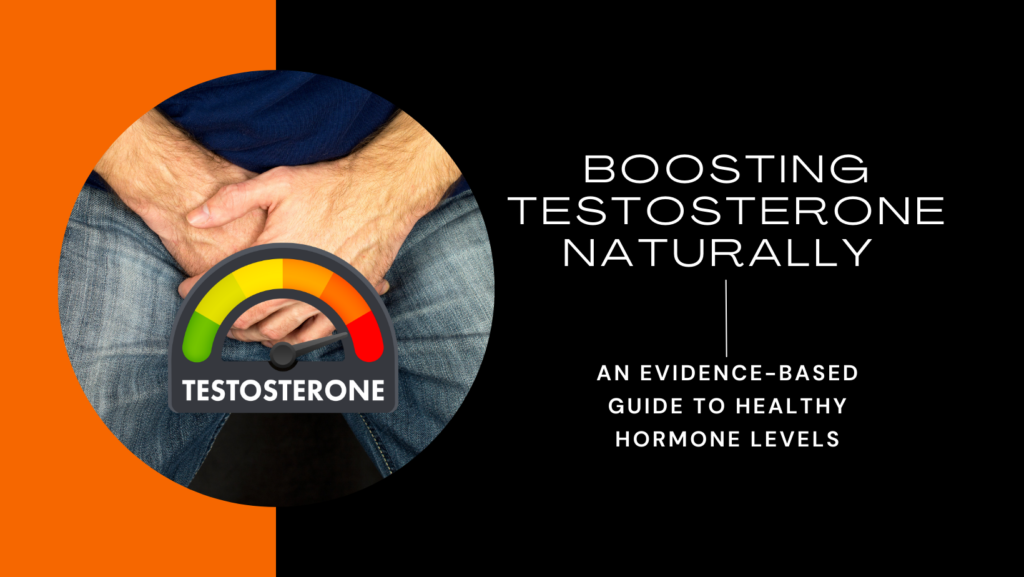As a personal trainer in my 40s, I’ve experienced firsthand the importance of maintaining healthy testosterone levels for muscle building and overall well-being. This becomes increasingly pertinent as we age. Many of my clients, wary of steroids or Testosterone Replacement Therapy (TRT), seek natural methods to enhance their testosterone levels. Here’s a deeper dive into how testosterone works and natural ways to boost it.
Understanding Testosterone: More Than Just a Muscle Builder
Testosterone is often associated with muscle growth, but its role is much broader. It’s crucial for bone density, mood regulation, and healthy libido. Interestingly, the relationship between testosterone and muscle mass isn’t as straightforward as it seems. High testosterone levels don’t always guarantee muscle growth, which can be surprising for many. This is where genetics play a role – specifically, the density of androgen receptors in your body. These receptors are the key to how your body utilises testosterone. A mutation in the AR gene can hinder these receptors, making your cells less responsive to testosterone. This is why simply boosting testosterone might not be a complete solution for everyone.
Symptoms of Low Testosterone
Low testosterone can manifest in various ways: reduced sex drive, erectile dysfunction, loss of body hair, mood swings, and even depression. These symptoms can severely impact one’s quality of life.
Lifestyle: The First Step
Before jumping into supplements, it’s crucial to evaluate your lifestyle. Are you getting enough sleep? How is your stress level? What about your diet? These factors significantly impact your hormonal health. Addressing these ‘big rocks’ can often bring about remarkable changes without needing to delve into more nuanced solutions.
When Supplements Come Into Play
Supplements might be the next step for those who have addressed lifestyle factors but still face challenges. This is where the combination of vitamin D and zinc comes into the picture.
- Vitamin D and Testosterone Levels:
- Vitamin D, a fat-soluble vitamin, is crucial in bone health and the immune system. A study found that overweight men who took vitamin D supplements experienced a significant increase in testosterone levels (PubMed ID: 21154195).
- Zinc’s Role in Hormonal Health:
- Zinc is essential for growth and development, and it’s been shown to influence testosterone production. A study linked zinc deficiency with hypogonadism in men, and supplementation in marginally zinc-deficient men resulted in increased serum testosterone levels (PubMed ID: 8875519).
- Combining Vitamin D and Zinc:
- While direct studies on their combined effect on testosterone are limited, their individual roles suggest a synergistic potential. For instance, a study showed positive effects on mood with co-supplementation, highlighting the overall health benefits of this duo (PubMed ID: 31837640).
Setting a Baseline and Monitoring Progress
Before starting any supplement regimen, the gold standard would be to get a blood test to determine your current testosterone levels. This will help you track any improvements objectively, retesting every three months to assess changes and adjust your approach accordingly, as this will give you a true and accurate representation of what is happening.
Conclusion: A Holistic Approach to Hormonal Health
Boosting testosterone naturally is a journey that transcends mere supplementation. It’s a holistic approach, intertwining a healthy lifestyle, a balanced diet, and regular exercise.
These fundamental factors are the bedrock of hormonal health, and neglecting them can render any supplementation a pointless waste of money.
In today’s health-conscious world, several reputable companies offer comprehensive blood testing and expert medical advice to guide you on this journey. Companies like Medichecks, Thriva, and LetsGetChecked provide easy access to blood tests that can measure your testosterone levels alongside other key health markers.
These services often include consultations with specialists trained in hormone optimisation, offering personalised advice and tailored prescriptions based on your unique results.
When considering the addition of supplements like vitamin D and zinc to your regimen, it’s worthwhile consulting with a healthcare professional, particularly if you’re currently on medication or managing specific health conditions, as there could be unexpected side effects.
A healthcare provider can offer insights into how these supplements interact with your current health status and medications, ensuring a safe and effective approach to boosting your testosterone levels.
Remember, the pursuit of hormonal balance is comprehensive, demanding attention to all aspects of your health. By leveraging the expertise of specialists and incorporating a well-rounded lifestyle approach, you can navigate the path to improved hormonal health with confidence and clarity.
Allowing you to feel more like your younger self once more!

